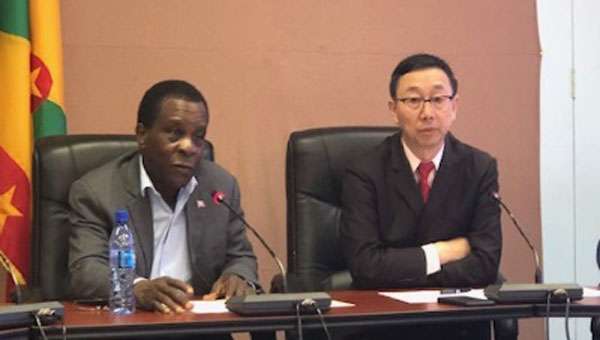ST. GEORGE’S, Grenada, February 14, 2019 (CMC) – The International Monetary Fund (IMF) expressed satisfaction, today, with the Grenada economy, five years after the island had adopted a home-grown, structural-adjustment program with the Washington-based financial institution.
“We hope that we will work together in the future to build up on the base on the good performance of the country, and also, based on our very good relationship, to continue our joint efforts to make the country better,” IMF Deputy Managing Director, Tao Zhang, told a news conference.
Grenada entered into the three-year, US$21.9 million IMF-supported, Homegrown Structural Adjustment Programme in January 2014. The main objectives of the program were to boost inclusive growth and job creation and to restore fiscal and debt sustainability.
Zhang, who is ending a three-day visit to the island, said he met with representatives of the social partners and other stakeholders.
He said that the purpose was to try and enhance the existing good relationship with the Grenada government and to improve the institution’s understanding of what is going on in the island, which is experiencing six consecutive years of growth and a debt ratio, which moved from 108 percent of gross domestic product (GDP) in 2013 to 62 percent, last year.
“Grenada’s authorities have done remarkable things in bringing down debt and leaving better public finances for future generations. These important gains are a national asset and a product of the hard work of all Grenadians. They deserve to be protected,” the IMF official added.
Prime Minister, Dr. Keith Mitchell, who was also present at the news conference, said the progress made in the country is now becoming best-practice for other IMF member states, and that the positive rating from the Washington-based financial institution would provide further opportunities from other international organisations.
“When the IMF gives a great grade, it sends a message to others, and this is how we get tremendous opportunities from other donors,” said Mitchell, noting, however, that the positive rating will not translate into Grenada receiving special gifts from the IMF.
Zhang said that the policy of fiscal discipline, instituted by the current administration, supported by the Fiscal Responsibility Law, helped to break a pattern of high debt and low growth.
“The fiscal adjustment helped cut the deficit by almost 10 percent of GDP. It also helped reduce public debt from 108 percent of GDP in 2013 by more than 40 percentage points, by now,” said Zhang, who explained that contrary to popular belief, the significant fiscal adjustment did not negatively impact output.
“Growth in Grenada has averaged five and a half percent, annually. This compares favourably with other countries in the ECCU and the Caribbean. Crucially, the government’s strong efforts received broad backing from domestic stakeholders, through a negotiated social compact.”
But Zhang said notwithstanding these positive developments, there is a need for the country to focus on building resilience.
“The focus on post-disaster recovery should be supplemented with better all-around preparedness. The experience with hurricanes in the region continues to highlight the need to build more resilient infrastructure and have resources to address problems immediately,” he said.
 Pride News Canada's Leader In African Canadian & Caribbean News, Views & Lifestyle
Pride News Canada's Leader In African Canadian & Caribbean News, Views & Lifestyle





